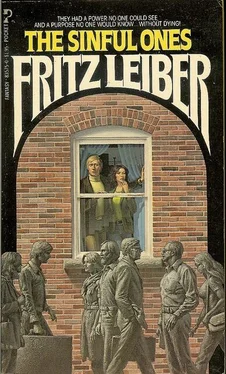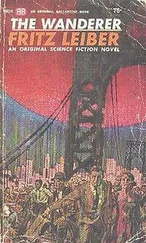Fritz Leiber - The Sinful Ones
Здесь есть возможность читать онлайн «Fritz Leiber - The Sinful Ones» весь текст электронной книги совершенно бесплатно (целиком полную версию без сокращений). В некоторых случаях можно слушать аудио, скачать через торрент в формате fb2 и присутствует краткое содержание. Жанр: Фантастика и фэнтези, на английском языке. Описание произведения, (предисловие) а так же отзывы посетителей доступны на портале библиотеки ЛибКат.
- Название:The Sinful Ones
- Автор:
- Жанр:
- Год:неизвестен
- ISBN:нет данных
- Рейтинг книги:3 / 5. Голосов: 1
-
Избранное:Добавить в избранное
- Отзывы:
-
Ваша оценка:
- 60
- 1
- 2
- 3
- 4
- 5
The Sinful Ones: краткое содержание, описание и аннотация
Предлагаем к чтению аннотацию, описание, краткое содержание или предисловие (зависит от того, что написал сам автор книги «The Sinful Ones»). Если вы не нашли необходимую информацию о книге — напишите в комментариях, мы постараемся отыскать её.
Carr Mackay had an okay job, a beautiful woman and a lot of big plans—a pathway marked for himself through life.
But one day he met a beautiful, frightened girl who didn’t quite belong in this world. An something began. Irrevocably. Something that diverted him forever from his path, shook the sleepy dust from his eyes and brought him to a startling confrontation with the furthest limits of life, death—and an alien, terrifying danger…
The Sinful Ones — читать онлайн бесплатно полную книгу (весь текст) целиком
Ниже представлен текст книги, разбитый по страницам. Система сохранения места последней прочитанной страницы, позволяет с удобством читать онлайн бесплатно книгу «The Sinful Ones», без необходимости каждый раз заново искать на чём Вы остановились. Поставьте закладку, и сможете в любой момент перейти на страницу, на которой закончили чтение.
Интервал:
Закладка:
The screams stopped.
Dris, Miss Hackman, and Mr. Wilson reached the store and hurried inside.
Miss Hackman came out after a moment. Her feet dragged. She was looking at the sidewalk. Her complexion wasn’t good. Carr and Jane could see her stomach suddenly jerk in and her shoulders heave forward.
The black shape came out and rubbed against her affectionately, and now Carr recognized it. It was a black cheetah. Miss Hackman averted her eyes and flopped her hand at it. It persisted. She walked off toward the next corner, away from Jane and Carr. She had her hand to her mouth. The black cheetah followed, muzzling her ankles.
Red blotches appeared on her stockings.
Jane and Carr began to back away.
Mr. Wilson came out of the store. He looked around. He saw Miss Hackman and hurried after her.
Carr and Jane continued to back away. They passed a series of chromium fitted windows, recrossed the street behind them, started back along the library. The sidewalk crow, a minute before so think, had now thinned disturbingly.
Mr. Wilson caught up with Miss Hackman. She stopped. He seemed to be expostulating with her and she to be nodding her head abjectly.
“We’ll cut over to the Loop at the next corner,” Carr whispered. Jane nodded.
They turned and walked swiftly along the blank wall of rough stone beneath the library’s recessed windows. They had almost reached the corner when a bus drew up at it and a crowd of sailors came whooping out, their legs working like blue scissors. Carr had fallen back a little. Just as Jane went around the corner the sailors cut in between them. Before he pushed through he took one last backward look.
Driscoll Aimes wasn’t more than thirty feet behind him, stepping along briskly. He saw Carr and Carr saw him. For a moment he stood stock-still. Then he came on with a rush.
Carr turned and ran across the street, straight up Michigan Boulevard, praying that Jane would keep on going and escape notice.
The bright-eyed, sulky-lipped mannequins in the dress shops were more alive than the people around whom he swerved and dodged.
He looked back. He had gained on Driscoll Aimes, who was running easily. And—thank God!—Jane wasn’t in sight.
Carr darted down the iron stairs into the dimness of the lower-level street. The tread clanged under his feet.
Once underground, he kept on running in the same direction. The sidewalk here was about five feet above the cobbled street, level with the tops of the cars parked side by side in a continuous row. At intersections it descended by steps and ascended again. Two blocks ahead, rectangular windows of twilight indicated the embankment and the river.
At the end of the last block, Carr darted another backward look. Dris was not in sight, but, bounding along the tops of the parked cars, as if their painted metal were a more congenial surface to its feet than the concrete of the sidewalk, came the black cheetah.
Carr remembered the screams that had come from the haberdashery.
He plunged down the last steps, darted in front of a truck that dribbled ashes, and sprinted toward the embankment. Behind him he could hear a rhythmical padding.
He burst into the twilight of the embankment.
Without checking his pace, he crossed it and dove toward the oily water.
He had a glimpse of black pilings rushing by. His head was struck a heavy blow. There was a rush of pain.
He was conscious of the coldness of the water, of the weight of his clothes, of fading light, of nothingness.
Chapter Fourteen
The Cleared Vision
First there was a throbbing. Then the throbbing split into two parts: pain and a slow rocking. Then several sensations: The reek of burning oil and water-rotted wood. The feel of blankets against naked skin. A swaying light. A low ceiling. A general ache. A faint nausea.
Then the realization that all this centered in one person and that person was himself.
Then a great misty oval above him that slowly unblurred into a face. A huge pale face with wide heavy jaws that suggested glandular dysfunction. A wide mouth with pendant underlip and yellowed teeth. Heavily seamed cheeks, a bashed-in nose, cavernous eye-sockets with large unwinking eyes, the whites faintly muddied. Tufty black eyebrows shot with gray. Above, a great white dome of forehead. The expression was one of brooding solitude.
Carr felt a big hand under his shoulders lifting him effortlessly. A thick glass was gently pushed against his lips.
“Here.”
It was whisky and water. Carr drank it in small swallows. Then he looked at the face again. He recognized the giant bargeman who had once looked up at him on the bridge. He guessed he was in the cabin of the black motor-barge.
But he didn’t want to think. It wasn’t the pain so much as a general sick listlessness. He was content to lie back in the blankets.
The bargeman stood up. He was so tall that in spite of his stooping, his head barely missed the small, curved beams that supported the roof of the cabin, and from one of which a flaring oil lamp hung.
“You’ll live, all right,” he said in a rumbling voice. “Though I wouldn’t have sworn to it when I fished you out. How’d you get in that fix anyway? Who was it you bothered? I suppose you went around stirring things up, like most of the other fools. The gang don’t like that. It spoils their show. You ought to learn to live quiet, like I do.” And he reached out a big splay-fingered hand and poured himself a drink of whisky in the tumbler from which Carr had drunk.
The paint on the walls was blackened and peeling. At the far end was a small cookstove, a pantry, a sink, and a rusty watertank bracketed to the ceiling. At the same height were several ventilation slits but Carr couldn’t see out of them. He noticed his clothes drying on a short washline. Opposite the bunk was a wide sliding door, shut. There were several chests and boxes about. Next to the door was a bookcase made of fruit crates. It was packed with thick volumes. Tacked to the wall wherever space allowed were pictures of prizefighters, cut from newspapers, and cheap reproductions of engravings and etchings by Dore and Goya.
The bargeman poured himself another drink of whisky and sat down in a gray unpainted chair. He scratched the hair on his chest where it brushed out around his undershirt. He frowned at Carr.
“How’d you catch on, anyway?” He sat forward, elbows on knees. “Most folks don’t, you know. They can’t.”
He paused, as if to let his words sink in. Then, “It happened to me pretty sudden,” he continued. “My name’s Jules. Old Jules. I used to be a sailor, but I liked to think I’d go to one of the big libraries and make them get me all sorts of books. Philosophy, metaphysics,” he split the syllables carefully, “science, even a little religion, I’d read in them and try to figure out the world. What was it all about, anyway? Why was I here? What was the point in the whole business of getting born and working and dying? What was the use of it? Why’d it have to go on and on?
“And why’d it have to be so damn complicated? Why all the building and tearing down? Why’d there have to be cities, with crowded streets and busses and cable cars and electric cars and big openwork steel boxes built to the sky to be hung with stone and wood—my only friend got killed falling off one of those steel boxkites. Shouldn’t there be a simpler way of doing it all? Why did things have to be so mixed up that a man like myself couldn’t have a single clear decent thought?”
Carr listened dreamily. The whisky was taking effect. His head didn’t ache so badly now.
“More’n that, why weren’t people a real part of the world?” the other continued, taking a gulp of whiskey from the glass. “Why didn’t they show more honest-to-God response? Yes, that was it—response. For instance, when you slept with a woman, why was it something you had, and she didn’t? Why, when you went to a prize fight, were the bruisers only so much meat, and the crowd a lot of little screaming popinjays? Why was a war nothing but marching and blather and bother? Why’d everybody have to go through their whole lives so dead, doing everything so methodical and prissy, like they was a Sunday School picnic or an orphan’s parade?”
Читать дальшеИнтервал:
Закладка:
Похожие книги на «The Sinful Ones»
Представляем Вашему вниманию похожие книги на «The Sinful Ones» списком для выбора. Мы отобрали схожую по названию и смыслу литературу в надежде предоставить читателям больше вариантов отыскать новые, интересные, ещё непрочитанные произведения.
Обсуждение, отзывы о книге «The Sinful Ones» и просто собственные мнения читателей. Оставьте ваши комментарии, напишите, что Вы думаете о произведении, его смысле или главных героях. Укажите что конкретно понравилось, а что нет, и почему Вы так считаете.









